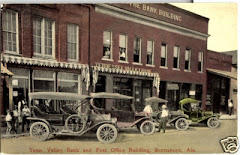Monday night's City Council work session agenda contained one issue - a written request from Deborah Light and Deborah Dunsmore, Attorney-At-Law, "Application to Authorize the Incorporation of the Downtown Scottsboro Redevelopment Authority."
Unfortunately it seems many are in denial that the downtown area of Scottsboro suffers from blight. Below you will find the definition of blight; a Redevelopment Authority could possibly benefit the citizens of Scottsboro. Unfortunately, there is no plan or understanding which has been expressed to date as to what a Redevelopment Authority wants to accomplish.
No plan equals no action. To expand government just for the sake of expansion for the purpose of free government sponsored entertainment in the downtown area of Scottsboro is not Redevelopment. Hopefully the originators of the request will present a plan of action.
The request and video of the session is posted below. The American Planning Association's guidance and link on this issue is provided below.
VIDEO
Free Entertainment on the public square is not redevelopment. However, revitalization plans which might contain public entertainment in public venues might be part of a redevelopment plan; the idea is to encourage economic growth of the area to be redeveloped, free entertainment might detract from business. Any entertainment event must compliment business, not remove customers from business. This is the reason the city does not allow new products to be sold at First Monday.
About Redevelopment from the American Planning Association
Redevelopment: The term "redevelopment" is meant to describe one or more public actions that are undertaken to stimulate activity when the private market is not providing sufficient capital and economic activity to achieve the desired level of improvement. This public action usually involves one or more measures such as direct public investment, capital improvements, enhanced public services, technical assistance, promotion, tax benefits, and other stimuli including planning initiatives such as rezoning.
Public agencies typically offer a combination of incentives and undertake redevelopment programs pursuant to a statutory system for creating, financing, and operating redevelopment areas.
Changing Definition of Blight: In many cases, the "blight" to be eliminated is not the grotesque living conditions or deteriorated industrial areas that urban renewal programs were thought to address in the 1950s and 1960s. Rather, they are under-performing or obsolete land uses or buildings that exist where the rational private investment cannot overcome market forces. In such situations disinvestment and blight may have already occurred or are deemed likely to occur.
The American Heritage Dictionary of the English Language, 4th ed., offers what may be the simplest definition of blight: "Something that impairs growth, withers hopes and ambitions, or impedes progress and prosperity." Within planning and redevelopment practice, blight may refer to these impairments on the physical fabric (buildings, properties, public improvements, etc.) on community structure and social fabric (neighborhood vitality, security, public health and welfare, etc.) or on the economy (property values, tax base, facility obsolescence, employment base, etc.).
Effectiveness of Planning in Redevelopment: Planning has not been as effective as we might like in keeping a central place in the economic engine. One result has been a failure to recognize that the circumstances that lead to blight often require a more comprehensive set of remedies than "economic redevelopment" proposals that simply change existing physical conditions.
Several factors may account for this shift in redevelopment practice. Planners, who in the early years of redevelopment practice were leaders in defining the scope and practice of redevelopment, are often eclipsed today by special interest redevelopment organizations that may or may not have the broadest possible perspective. While redevelopment has emerged as a significant specialty in public practice, there are few degree programs across the country focused specifically on urban and rural redevelopment.
Abuse of Process: The same procedural protections that we count on to protect the rights of individual property owners can also be used to thwart legitimate redevelopment. Where enabling legislation is badly written or misinterpreted, it may be possible that abuse of redevelopment authority undermines the public perception of the legitimate use of these powers elsewhere.
Basic premises that should underlie and support all redevelopment:
1) A clearly defined process for determining eligibility of designating areas in which the municipality or other governments have the authority to engage in redevelopment projects including both prevention and elimination of blight and provision for public/private partnerships.
2) A means of choosing partners that is fair, open, equitable, transparent (while protective of trade secrets or other proprietary data), and demonstrated to be the best choice for the public interest.
3) Mechanisms to prevent the use of partnerships to subvert the responsibilities that are imposed on the public agency through enabling legislation or case law to provide due process, demonstrate public purpose, and establish a nexus between the public purpose for redevelopment and the means to achieve that purpose.
4) Assurance that public/private partnerships adhere to the adopted plans of the jurisdiction.
5) Requirements for clearly defined responsibilities and liabilities of public and private partners.

















No comments:
Post a Comment